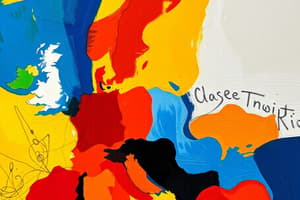Podcast
Questions and Answers
According to Immanuel Kant, what is the first stage of historical progress?
According to Immanuel Kant, what is the first stage of historical progress?
- Formation of the state (correct)
- Monopolization of force
- Transformation of relations of force into legal relations
- Subjecting individual arbitrariness to law
What does Immanuel Kant define as 'Perpetual Peace'?
What does Immanuel Kant define as 'Perpetual Peace'?
- A balance of powers that ensures peace
- The end of all hostilities, not just the suspension of hostilities between two wars (correct)
- The creation of a military alliance for peacekeeping
- The absence of wars between major powers
What does European Integration mean in the context of the text?
What does European Integration mean in the context of the text?
- The political definition of Europe
- The process of unification and cooperation among European countries (correct)
- The geographical definition of Europe
- The historical evolution of European identity
According to Immanuel Kant, what does world federation ensure?
According to Immanuel Kant, what does world federation ensure?
What is the link proposed by Immanuel Kant between world federation, perpetual peace, and human emancipation?
What is the link proposed by Immanuel Kant between world federation, perpetual peace, and human emancipation?
What is the main idea behind the concept of 'Perpetual Peace' according to Immanuel Kant?
What is the main idea behind the concept of 'Perpetual Peace' according to Immanuel Kant?
According to the Ventotene Manifesto, what is the key starting point for reflection?
According to the Ventotene Manifesto, what is the key starting point for reflection?
What is the goal of European supranational democracy according to the Ventotene Manifesto?
What is the goal of European supranational democracy according to the Ventotene Manifesto?
What did the Ventotene Manifesto propose as a 'spiritual' objective for the federated Europe?
What did the Ventotene Manifesto propose as a 'spiritual' objective for the federated Europe?
What was the impact of the Ventotene Manifesto in 1945?
What was the impact of the Ventotene Manifesto in 1945?
What was one of the reasons for federalism losing momentum after the end of the war?
What was one of the reasons for federalism losing momentum after the end of the war?
Which of the following has been realized as part of the initial projects despite the absence of a European Federation?
Which of the following has been realized as part of the initial projects despite the absence of a European Federation?
What was one of the attempts to bring the EEC/EU closer to a more federal structure?
What was one of the attempts to bring the EEC/EU closer to a more federal structure?
What was the central task according to the Ventotene Manifesto?
What was the central task according to the Ventotene Manifesto?
What did Proudhon's federalism envision?
What did Proudhon's federalism envision?
Who sought Italian political unity and European unification?
Who sought Italian political unity and European unification?
What was the primary criticism of the League of Nations according to Einaudi?
What was the primary criticism of the League of Nations according to Einaudi?
What did the Paneuropa Movement aim to address?
What did the Paneuropa Movement aim to address?
Who wrote the Ventotene Manifesto in the 1940s?
Who wrote the Ventotene Manifesto in the 1940s?
Who denounced the authoritarian nature of the unitary nation-state and proposed a federal solution for Italian unification and European peace?
Who denounced the authoritarian nature of the unitary nation-state and proposed a federal solution for Italian unification and European peace?
Study Notes
- The text discusses various theories and movements towards federalism and European unity throughout history, with a focus on the period leading up to World War II.
- Federalist theory posits that republican states are necessary for freedom, democracy, and justice, but international anarchy makes it difficult for these principles to be consolidated within individual states.
- Proudhon's federalism envisions a confederation of states where central authority is subordinate to member states, with the municipality being the primary center of organization. He rejects the idea of a state due to its exploitative nature.
- Mazzini sought Italian political unity and European unification, with the belief that the nation was a vehicle for achieving freedom and universal brotherhood.
- Cattaneo, a forerunner of 20th century European federalism, denounced the authoritarian nature of the unitary nation-state and proposed a federal solution for Italian unification and European peace.
- The League of Nations was founded in the aftermath of World War I, but Einaudi, a critic of the League, saw it as a mere confederation and believed that only a federal union could bring true peace.
- The Paneuropa Movement was initiated by Richard Coudenhove-Kalergi in 1923, aiming to address the problem of Europe's division and inability to maintain peace and independence.
- The Ventotene Manifesto, written by Ernesto Rossi, Altiero Spinelli, and others in the 1940s, called for a free and united Europe, drawing inspiration from English federalist literature. The manifesto gained widespread circulation and influenced European integration efforts.
- Key figures and movements mentioned include Junius, English federalist literature, the canteens, the Briand-Stresemann pact, Lord Lothian, and the Federal Union movement.
- The texts discuss the development and dissemination of ideas regarding European unity and federalism throughout history, with a focus on the intellectual and political movements that led to the creation of the European Union.
Studying That Suits You
Use AI to generate personalized quizzes and flashcards to suit your learning preferences.
Related Documents
Description
Explore the concept of European Integration in a long-term historical context, from its origins to its development over the centuries. Delve into the uncertain definitions from geographical and political perspectives and examine influential philosophers' views, like Immanuel Kant's contribution to the idea of European cooperation.



